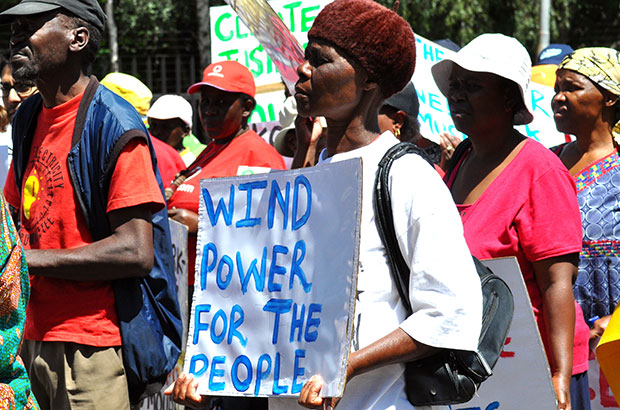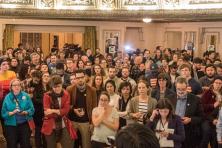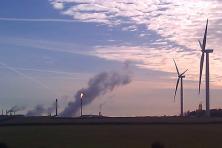“Invest in what helps. Divest from what harms.” - President Obama at UC Irvine, 2014
“Invest: to furnish with power, authority; to infuse or belong to.” - Dictionary.com
------------------------------------------------------------------------------------
The climate challenge is big, but it’s almost as simple as this: we’re too invested in fossil fuels. We’re giving them too much of our power and authority. And money, so much money.
Global Divestment Day on February 13 is a golden opportunity to start turning that around.
Even fossil fuel companies don’t have enough power to get us to consciously choose the only future they offer – a future of concentrated wealth and power, economic and geopolitical insecurity, and devastating climate disruption. But we have a devil of a time choosing otherwise, because they’ve got their hooks so deep into our economy and our politics. They’ve nearly perfected the art of persuading us that we have no choice.
Our retirement savings and university endowments are capital pools for increasingly reckless adventures in fossil fuel extraction. Our ability to go to work, buy food, and educate our kids all depend on motorized transportation, overwhelmingly powered by oil. When I put my credit card in the gas pump, I pay for industry-sponsored climate denial and further exploration for “unburnable” carbon reserves. I can’t even drive to a climate presentation or run the Powerpoint deck without making it worse. Every time we turn around, we feed the beast. So how can we square up and fight it?
Harvard University President Drew Faust generously elucidated the problem in her statement rejecting divestment (BTW, Harvard students have no intention of accepting this answer):
“If we were to sell our shares, those shares would no doubt find other willing buyers. Divestment is likely to have negligible financial impact on the affected companies…. I also find a troubling inconsistency in the notion that, as an investor, we should boycott a whole class of companies at the same time that, as individuals and as a community, we are extensively relying on those companies’ products and services for so much of what we do every day.”
Faust captures the sense of complicity and fatalism that threatens to render us useless in the face of the climate crisis. We let our unavoidable contributions to the causes of climate disruption erode our will, our standing to insist on solutions. As we chase our tails about “troubling inconsistencies,” we retreat into moral numbness. We somehow accept the idea that it’s okay to take a cut of the profit from increasing fossil fuel dependence – averting our eyes from the unthinkable human suffering it causes – on the grounds that someone else will do it if we don’t. We allow our institutions of higher education to invest in industries that oppose climate action by waging a war on truth and reason – a war on the defining purposes of those institutions.
It’s like one of those bad dreams where you try to run from danger but your legs just won’t move.
Divestment is an opportunity to wake from that nightmare. The campaign shines a bright light on our unwitting commitment to empower the forces that block solutions, even as we try to implement solutions ourselves. It presents a specific opportunity to reduce that commitment, to take some of our money back. Will we decline to do that because we are not yet in a position to take ALL of it back immediately? We’ll never get anywhere that way!
It’s a long road from here to solutions. We’re not going to quit fossil fuels and the jobs that depend on them tomorrow. We need to do that patiently, incrementally, and with a firm commitment to a just transition that produces more broadly shared prosperity. We just have to put one foot in front of the other until we do it.
And we can take one bold, hopeful step forward right now.
We can start winding down our investments in companies that block solutions, fund climate denial, and maul our communities in pursuit of ever more extreme fossil fuel extraction. We can stop investing in making it worse. And until we do that, nobody will believe us when we say we’re going to make it better. We won’t really believe it ourselves.
No, divestment won’t immediately, dramatically reduce fossil fuel company share prices (which, by the way, are tanking anyway – the sound of a bubble popping[i]?) And it certainly won’t, by itself, accomplish the necessary policy changes to drive the transition from fossil fuels to clean energy. But it will help us clear the biggest obstacle. It will deprive the fossil fuel juggernaut of some part of our complicity, our ambivalence, our license, our money. By putting a little financial daylight between us and the problem we’re trying to solve, it will feed our growing confidence that we can wage and win a clean energy revolution. Why bet against the solutions we’re trying to build?
Today, fossil fuels own us in part because we own them.
So tomorrow, divest.
Find out what’s going on in your community on Divestment Day.
You can divest as an individual too! Find out more. The pledge allows you to wind down your fossil fuel investments over time. Your interest in divesting will make it possible for more and better fossil free investment vehicles to be offered for individuals and retirement plans.
[i] There is a strong financial and fiduciary case for divestment – a growing body of evidence suggesting that the “carbon bubble” may already be popping, as global will for climate solutions grows and the clean energy revolution gains steam. I’m not going to make that case here, because, dammit, we should divest anyway. But check it out, e.g., in this terrific post from a Reagan appointee to the SEC, Bevis Longstreth, and also here.




